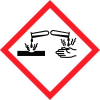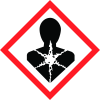Chloramphenicol
Sigma-Aldrich Chemie GmbH
Revision date : 2023-02-06


General Information
Revision date
2023-02-06
Product name
Chloramphenicol
CAS No.
56-75-7
REACH No
is
Emergency telephone
0800 181 7059 (CHEMTREC Deutschland
Icons in SDS
Company Information
Company name
Sigma-Aldrich Chemie GmbH
E-mail address of the competent person responsible for the Safety Data Sheet
technischerservice@merckgroup.com
GHS Information
Signal word
Danger
Hazard Codes
Hazard statements (CLP)
H318, H351, H361fd
Hazard statements
Code
Statements
H318
Causes serious eye damage
H351
Suspected of causing cancer
H361fd
Suspected of damaging fertility; Suspected of damaging the unborn child
Precautionary statements
Code
Statements
P202
Do not handle until all safety precautions have been read and understood.
P280
Wear protective gloves/protective clothing/eye protection/face protection.
P305+P351+P338
IF IN EYES: Rinse cautiously with water for several minutes. Remove contact lenses if present and easy to do - continue rinsing.
P308+P313
IF exposed or concerned: Get medical advice/attention.
P405
Store locked up.
P501
Dispose of contents/container to ...
Section 2
CLP CLASSIFICATION
Serious eye damage (Category 1), H318 Carcinogenicity (Category 2), H351 Reproductive toxicity (Category 2), H361fd For the full text of the H-Statements mentioned in this Section, see Section 16.
2.2 Label elements
Labelling according Regulation (EC) No 1272/2008
Signal word
Danger
Hazard statements
H318 Causes serious eye damage. H351 Suspected of causing cancer. H361fd Suspected of damaging fertility. Suspected of damaging the unborn child.
Precautionary statements
P202 Do not handle until all safety precautions have been read and understood. P280 Wear protective gloves/ protective clothing/ eye protection/ face protection. P305 + P351 + P338 IF IN EYES: Rinse cautiously with water for several minutes. Remove contact lenses, if present and easy to do. Continue rinsing. P308 + P313 IF exposed or concerned: Get medical advice/ attention. P405 Store locked up. P501 Dispose of contents/ container to an approved waste disposal plant.
Supplemental label elements
none
2.3 Other hazards
This substance/mixture contains no components considered to be either persistent, bioaccumulative and toxic (PBT), or very persistent and very bioaccumulative (vPvB) at levels of 0.1% or higher.

